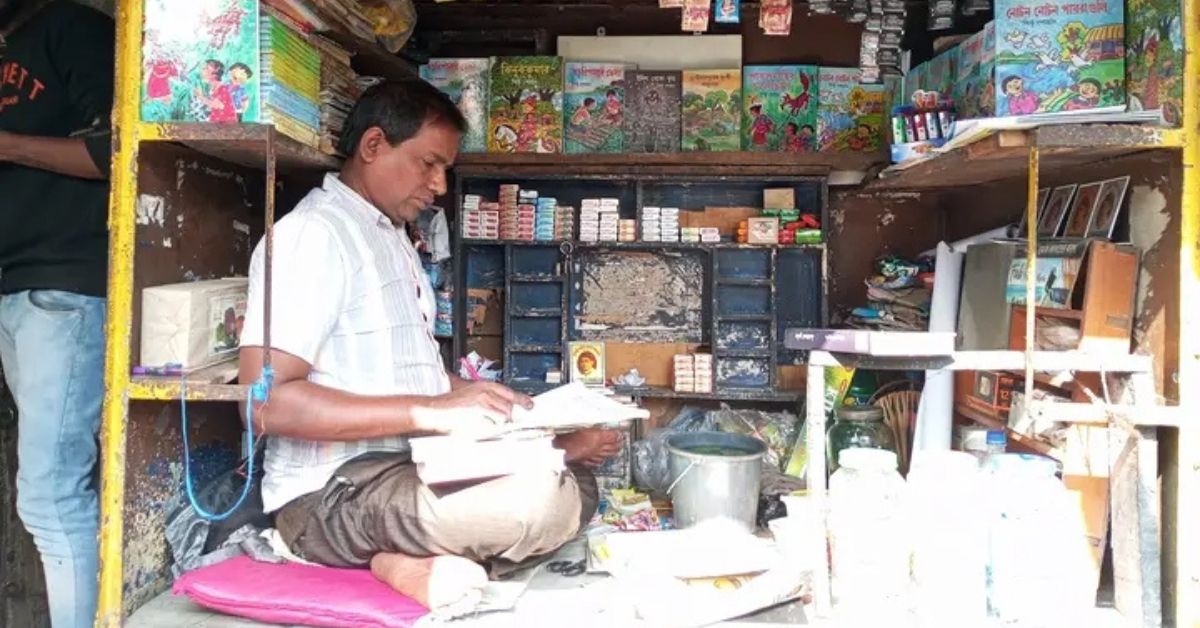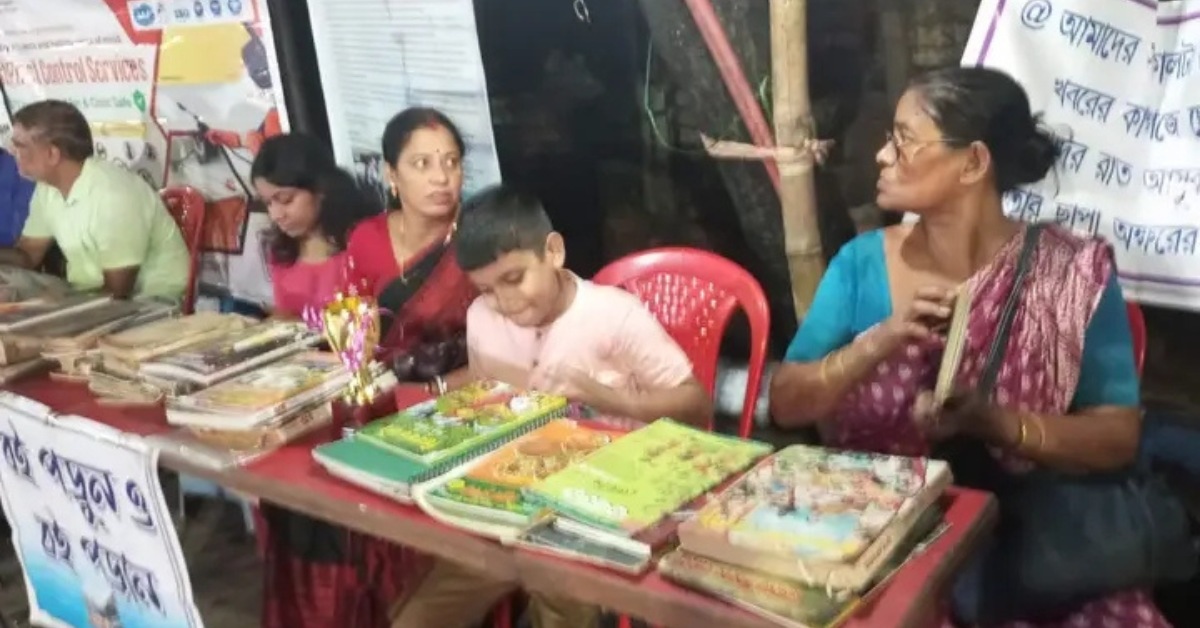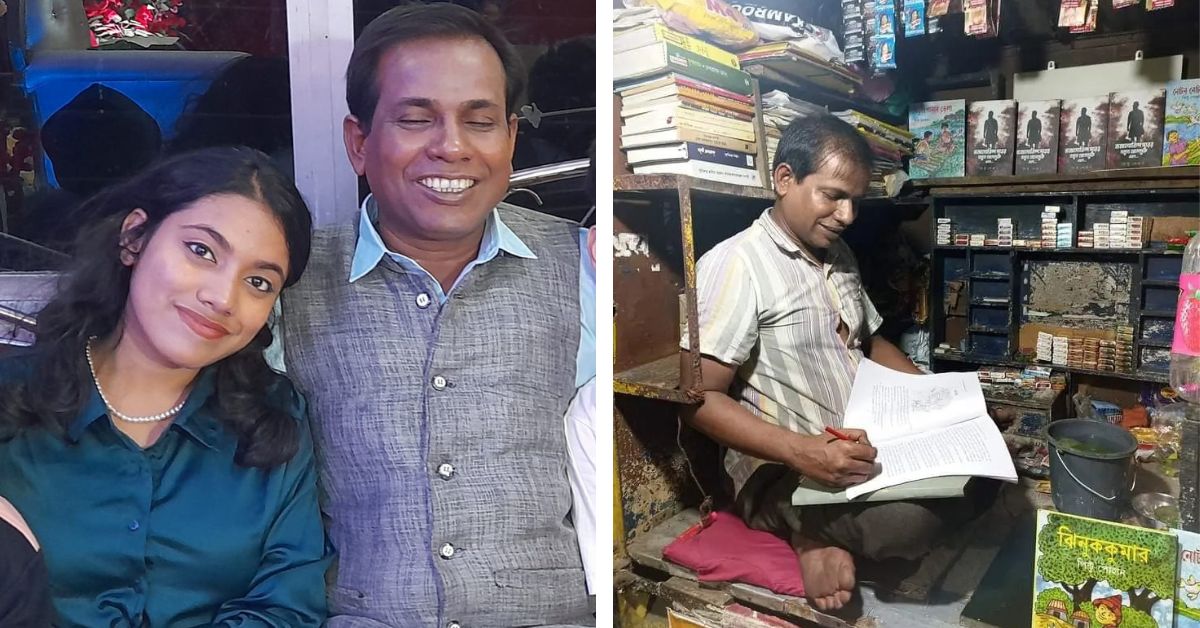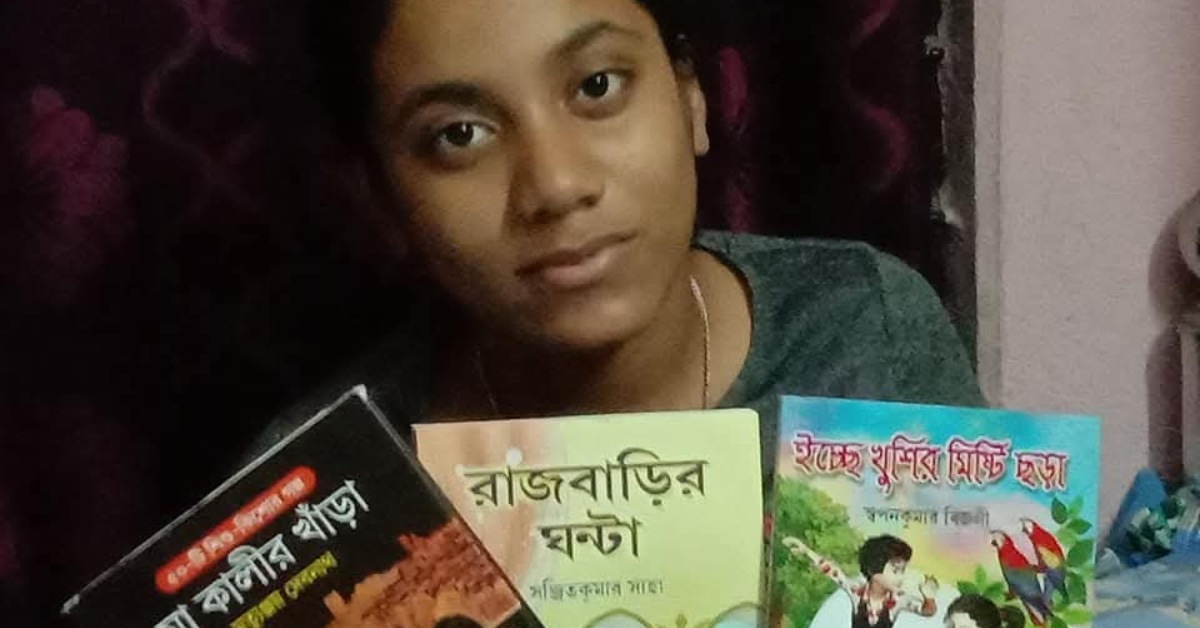From a Flood-Hit Slum in Kolkata, This Paanwala Wrote 10 Books While Running His Tiny Shop
“Ek sunsaan rasta hai,
Raat mein bachche baithe hain
Pet mein bhook hai pr,
Wo ye nahi jaante ki aaj ya kal khana milega ya nahi!
Aur yahi ek kalpana ki koi aayega, mera haath thamega
Aur mera bhagya sudhar jayega…. Isi tarah main story writing ki orr badh chala!”
“There’s a deserted road,
Children sit under the night sky,
Their stomachs are empty, yet
They don’t know if they’ll get food today or tomorrow.
And it’s this very imagination that someone will come, hold my hand,
And change my fate… That’s how I was drawn towards story writing!”
These are the words of Pintu Pohan, aka our Paanwala Author, who spoke to The Better India over the phone while he must have sat in his wooden paan shop, attending to customers in between.
Pinto Pohan, who got highlighted across social media for being the Paanwala with 10 published books and two in writing, has his shop in Kolkata’s Behala Street. While speaking to him, we realized that though life has tested this man at various points, his will to never give up couldn’t be shaken!
Pintu’s life story is a reality of thousands of slum dwellers who cannot afford two meals a day, live in dilapidated houses that flood during monsoons, and for whom education is a distant dream. But what is different in Pintu’s approach is his undying belief in education being the key to one’s upliftment.
So when The Better India reached out to Pintu, he reiterated one thing, “Dreaming and working towards making a dream come true are two different things and I strive for the latter. I have always believed in actions, even when the circumstances are not in my favour. I believe that consistency and perseverance are keys to being successful and this success should be your merit — incomparable and self-motivating.”
Floods of change: Early writing days and struggles
“When I was a child, there were floods in Madanmohantala slum. This was back in 1989, if I recall correctly when I was in class 4. The water levels kept rising, so we had to vacate. We went to my uncle’s place to live for a while. I was an introvert, so I wanted to read something, and I used to live in my world of imagination. While I was taking a stroll outside the house, I found a book under a tree. It had dust on it, and the corners were damaged. This book was a collection of short stories, and I started reading them, one after the other. And that is when it occurred to me that I wanted to be a lekhak (writer),” says Pintu, who asked us to wait for five minutes as he was applying choon on some betel nuts on the other side of the phone.
Pintu was studying at Barisha Jankalyan Vidyapeeth, and though his parents were daily wage workers and had to feed their family, Pintu never let poverty shadow his dream of studying while also taking up odd jobs so that his education would never burden his family. He even went on to collect and read books that used to be given to kabadiwalas (ragpickers) as raddi (paper waste).
“After discovering my fondness for writing, I never kept my pen down and when I was in eighth grade, I saw an advertisement in the newspaper that read, ‘Geetikar Chahi!’ which translates to ‘Songwriter wanted!’ I thought that this would be my breakthrough. I already had a collection of self-composed songs and poems by 1993, as I started writing back in 1989. After collecting Rs 10-15, I went to the address, and the advertiser took a look at my songs and told me that he would take two songs and charge me Rs 600. My heart shattered into pieces as my whole family’s income for a month would be Rs 300. However, I understood that it was a fraud, so I came back,” shared Pintu.
 With just Rs 1500, Pintu Pohan started his Paanwala dukaan around 1999.
With just Rs 1500, Pintu Pohan started his Paanwala dukaan around 1999.
As Pintu continued to speak about his struggles, I knew that this story was not a story of miraculous turns. Instead, this is a journey grounded in reality and that has borne the brunt of numerous hardships that Pintu has endured all these years.
He mentioned that public libraries like Barisha Pathaghar are where he used to spend most of his time as a child. For his high school, he got himself enrolled in coaching to help him pass his board exams in 1995. However, after clearing the exams, he had to drop out for a year as his father met with an accident at a construction site, and Pintu had to take up the responsibility of his family.
Later on, he collected some money and got himself admitted into a secondary school to complete his grades 11 and 12, and secured the highest marks in his school back in the year 1999. He then went to college to study Bachelor’s in Bengali Language but again had to give up because he couldn’t afford the college fees. His family had their struggle and Pintu too had to chip in to make ends meet.
Beginning of the post-graduate Paanwala chapter
Now, we were past our stipulated time of a 30-minute interview, but I knew that Pintu’s struggles were not only personal but also a reflection of deep-rooted unfair practices of exploiting daily wage labourers.
“So after dropping out of college, I went to do mazdoori (daily-wage labour). I worked with a contractor for three months, and he kept on telling me that he would pay me, but ultimately, that never happened. There were several other instances where I was met with humiliation, so I decided to do something of my own. With just Rs 1500 in my pocket, I started my Paanwala dukaan around 1999.”
 Putul Pohan, Pintu’s partner (L), shares that she wishes to continue her studies if their family’s financial conditions improve.
Putul Pohan, Pintu’s partner (L), shares that she wishes to continue her studies if their family’s financial conditions improve.
But did his conviction to complete his educational endeavours end here? The answer is no. Pintu used to and even today, starts his day as early as six in the morning and keeps his shop open till 11 at night. He highlights that he wanted to earn a little more than what others used to get from their paan shops because he had his dreams of becoming a writer to keep going, hence the extra-long work hours. And while managing his shop, he used to read books.
“People used to mock me, called me out for acting like Rabindranath Tagore. But I took that as a compliment. Although my early writings had been published in the local newspapers, I wanted to write books and become an author,” adds Pintu.
And all this while, Pintu made slow and steady progress. By 2005, he had completed a certificate course, a diploma, and an advanced diploma in Hindi. He also worked for a local newspaper where he earned Rs 2500 per month. And all this while, Pintu toiled day and night in his shop, and finally, in 2012, he completed his Bachelor’s and in 2015 his Master’s degree. He expressed that he wanted to go into the teaching profession, but that was expensive for him.
Behind every storyteller is a family who believes in him
It was already past 11 at night, but the inquisitiveness to know Pintu’s story through his family’s lens was something that kept us awake. As promised, I rang him up at 11 at night to speak to his daughter and wife and when I heard Peu Pohan, his 19-year-old daughter speak over the phone, I knew that this father has not only kept his dream alive but also made sure that his children have what he didn’t have as a child — a stable education.
“I am currently pursuing a Bachelor’s degree in Zoology from Calcutta University and plan to continue my education with a Master’s degree. However, I also have a deep love for literature. If you visit our home, you’ll find books in every corner. This passion comes from Baba. Despite the many hardships he faced in his life, he has always made sure that my brother and I are protected from them,” shared Peu, beaming with pride that her father is now getting due recognition.
 Pintu’s daughter, Peu (L), studies zoology at Calcutta University
Pintu’s daughter, Peu (L), studies zoology at Calcutta University
In stories shaped by hardships, not every character gets to fulfill their dreams; some quietly make sacrifices and support others from the sidelines. In Pintu’s story, that person is his wife, Putul Pohan.
Putul, a homemaker and a dreamer, shared, “I married Pintu in 2001, and at the time, our financial situation didn’t allow both of us to pursue education. Things still aren’t easy, but I do hope to study someday. For now, I spend my free time reading books at home. I believe my children’s education should come first, and if circumstances improve in the future, I’ll consider continuing my studies.”
From Anand Bazaar Patrika to his first book: Pintu’s words have found a place
While he was working at his paan shop, Pintu kept writing prose and poetry which have been published in patrikas (magazine), namely, Anand Bazaar Patrika, Anandmela, Desh, Shuktara, Nabakallol, and more.
“In 2017, my first book, Parulmasir Chagalchana, was published. During the COVID-19 waves, everything again came crashing down as we did not have anything to eat. But it did not deter my belief in education being the key to change and I kept my kids in school.”
However, there is still a long way to go as he is yet to receive his due credit for his writings. He smiles over the phone, “I am grateful to social media and journalists because of whom people now know my story, and I will be able to keep my side of the story too and get due monetary recognition.”
 Peu Pohan says that if one visits their home, one will find books in every corner.
Peu Pohan says that if one visits their home, one will find books in every corner.
As our conversation drew to a close, one thing was crystal clear — Pintu Pohan’s story is far from over. The grind continues. His youngest son is now in grade four, and Pintu knows that there’s still a long road ahead to secure his future. Years of sitting for long hours at his paan shop have left Pintu with spondylitis, but not once has he allowed the pain to dim his determination.
He still begins his days at dawn and keeps the shop open late into the night, not just to chase his dream of writing, but to ensure that his family never has to sleep hungry. His daughter, Peu, quietly adds, “We’d truly appreciate if this story not only inspires people but also brings forward someone who can help us. Baba has done so much to keep his dream alive and protect ours, maybe now, someone can step in and support him too.”
If you wish to be that someone or do something for a person who has stayed true to his dreams, you can reach out to Pintu on 9874763819 or visit his shop in Behala Street, Kolkata.
All images courtesy Pintu Pohan
News